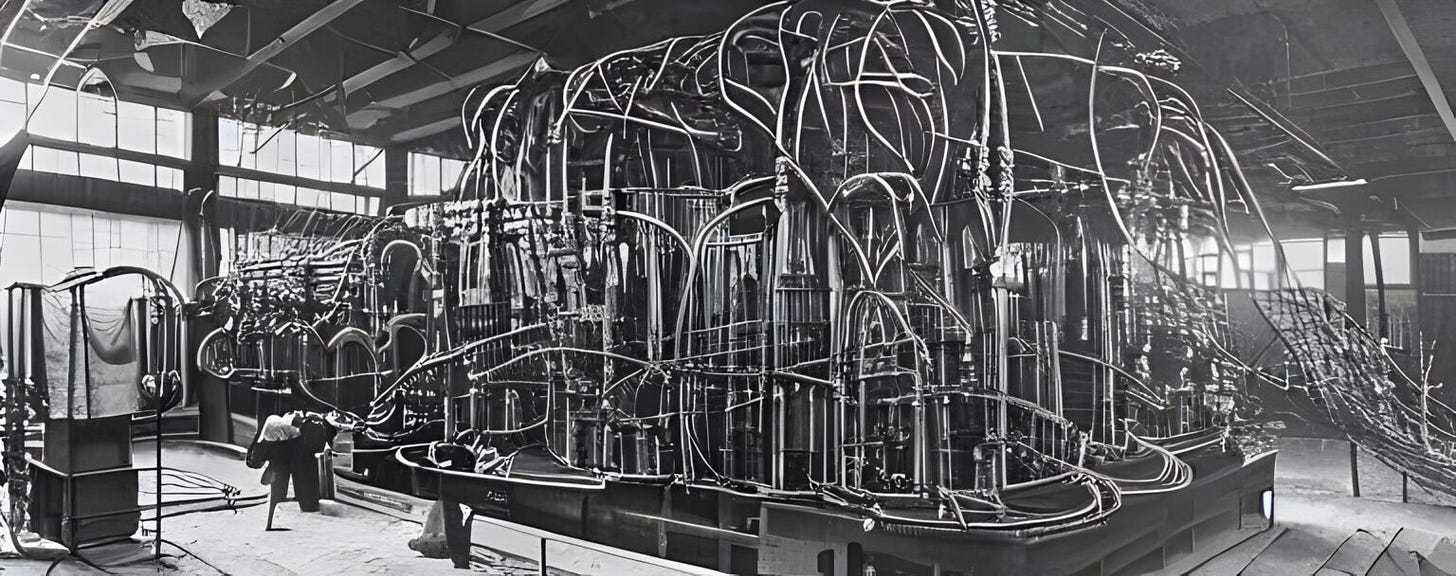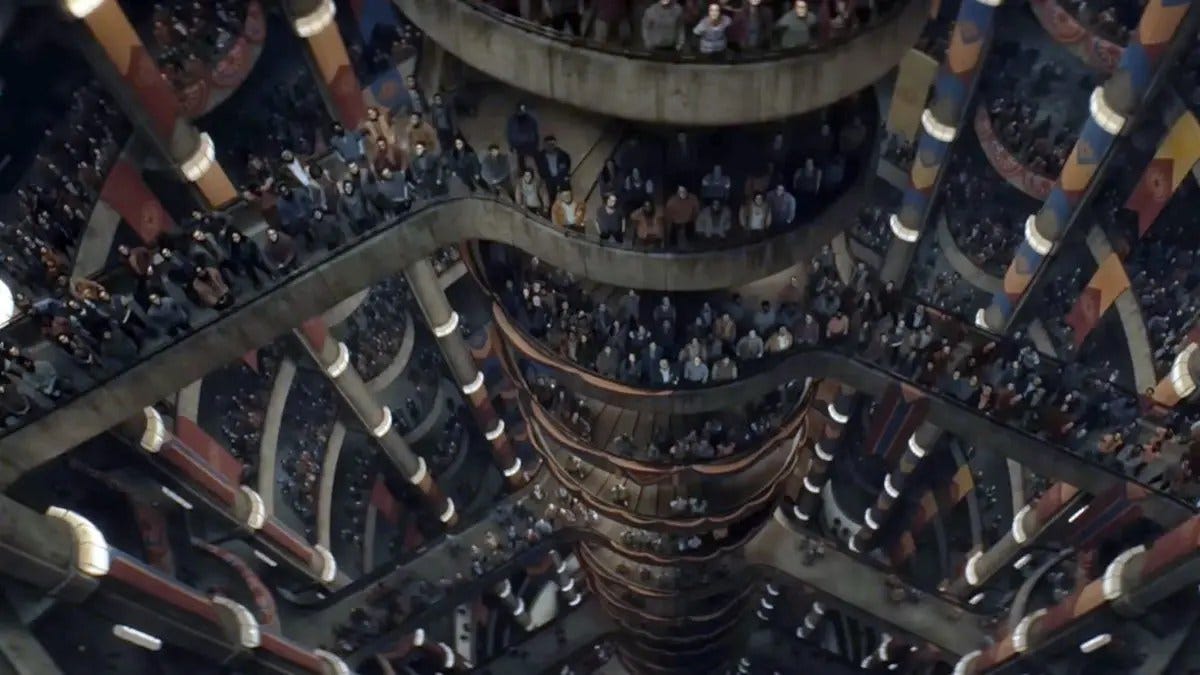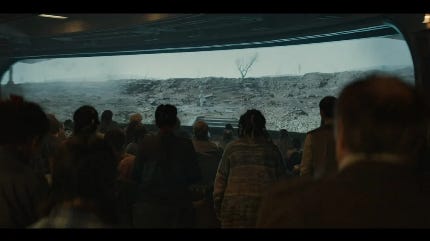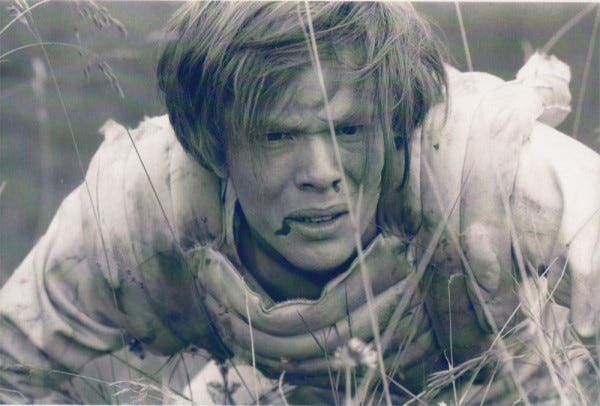The Siloing of Canadians
Canada has long had an inferiority complex in relation to the USA, and in its growing insularity it has developed a dangerous addiction to terminal despair fed to us through unrelenting rage and fear

In 1909, E.M. Forster wrote a novella called The Machine Stops. The story depicts a post apocalyptic society in which society lives underground and submits to a giant machine which provides for all of their collective needs. The dystopian culture of The Machine Stops discourages and demonises embodied living, human contact, and connection to the natural earth.
Those living the captive Machine life of this futuristic society have no idea of the surface dwellers. In fact they receive the repeatedly reinforced message that surface dwelling brings danger and death. They must remain in the safe arms of The Machine. Travel happens as a rarity, the culture discourages any kind of mobility, including travel to see friends of family. People live a solitary existence. Exchanging ideas through technologically driven communication serves as passage and creation of knowledge.
I read and studied this story when my daughter took it for a high school English Literature class several years ago. The prophetic quality of the story struck me quite profoundly back then. As time passes, the story has stuck with me and I can’t believe how Forster wrote such an accurate depiction of internet culture a century before its time.
In the same thought vein, I recently encountered a TV series called Silo (Apple TV). It depicts a similarly futuristic dystopian society, one where people live in underground silos because they believe environmental conditions have rendered the earth a deadly and unsafe place in which to live. As time passes and the series advances into itself, we discover that the earth may indeed safe and habitable in some places beyond the silo, we don’t know for certain, we only know that Silo management has deliberately kept important information from residents.
People called cleaners put in hazmat suits and go outside where they see a lovely world through a VR visor, they wipe the camera and then they die. Cleaning serves as a form of punishment for breaking rules in place to protect the collective and instil order. This control mechanism functions as a deterrent to perpetuate the ruse of the world outside the Silo as bad and toxic and dangerous and the Silo as a necessary safe haven.
In reality the hazmat suit has a faulty construction that builds in an air leak and that’s why the cleaners die. The VR visor gives a holographic vision of a lush environment, it’s a false vision. So, no one who leaves the Silo ever gets to discover what’s beyond their realm, they die before they can get beyond the grounds. Each of the 50 Silo societies has no idea of the existence of the other Silos. Each Silo society guards unique information unknown to other Silos societies. The faulty hazmat suits worn by the cleaners mean no one can venture outside the visible Silo vicinity to see that’s in the world beyond.
The outside environment in the Silo society has become toxic. We have no idea if it’s like that everywhere. Those who hold power don’t want people to know too much.1 Similarly, The Machine Stops society has become conditioned to believe the environment uninhabitable. Humans in The Machine Stops society live enslaved by forced dependence on a machinery embodying the concentration of power reminiscent of tyranny and wielding autocracy. Both Silo and The Machine Stops depict a humanity that remind me of Canadian society — insular, submissive and deferential to authority, kept in cells or cages by barriers of fear, ignorance, terminal despair.

In Canada, our state-funded media feeds us contrasting dystopian and fantastical distortions of reality, keeping us stuck in our silo. To a degree, large swaths of independent media keep us stuck in the silo of terminal despair with either of perpetual rage or perpetual fear. pick your ideologically curated narrative — Canada’s death spiral versus Canada’s hate spiral. From either side (right or left) we arrive at the same place— a place where the voice of doom says we must hate Canada and tear it all up or burn it all down.
Those who break away from the “order” through their choice of independent and critical thinking, skepticism, wrong think, or rejection of collectivism get banished from the Silo, equipped with a VR visor that gives viewers a false picture, equipped with a leaky hazmat suit. The cleaners in Silo remind me of cancel culture in Canadian society. In The Machine Stops Kuno violates the rules by rebelling and pursuing his desire to break free from isolation and live on the surface. Kuno’s punishment reminds me of cancel culture in Canadian society.
Cleaners in Silo will die for their disobedience, so too will disobedient citizens in The Machine Stops. Cancel Culture means we experience a sudden and merciless and cruel vanquishing from the collective. The contaminated must face expulsion from the collective, and live outside the camp.2 Anyone who violates collective will by choosing individual will find themselves thrust into forced deconstruction. Those who violate collective will bear the contagious affliction of contamination—for the safety of us all we must cancel them.
Kuno faces the threat of homelessness for his crime of wanting to experience surface dwelling. This entails expulsion from the underground city, it means death because humans, in their learned helplessness, have become unable to survive on their own, ie in self-sustaining fashion, on the surface. The Machine provides all and we need not seek beyond The Machine, lest we face expulsion from the paradisiacal Garden of Eden.
Canada, are you okay? I worry about you. I don’t hate you, Canada, I fiercely love you. Patriots, Canadians who love this land and the society it sustains, please stand up and push back against those who would tear it all apart and burn it all down.
Reader, remember the lesson from the creation myth of the Torah? When we eat of the fruit of The Tree of Knowledge, paradise becomes lost to us. Knowing too much necessitates our expulsion from Paradise.
In the Torah, those afflicted with a contaminant must dwell in isolation as long as the affliction remains in and on and with him.






